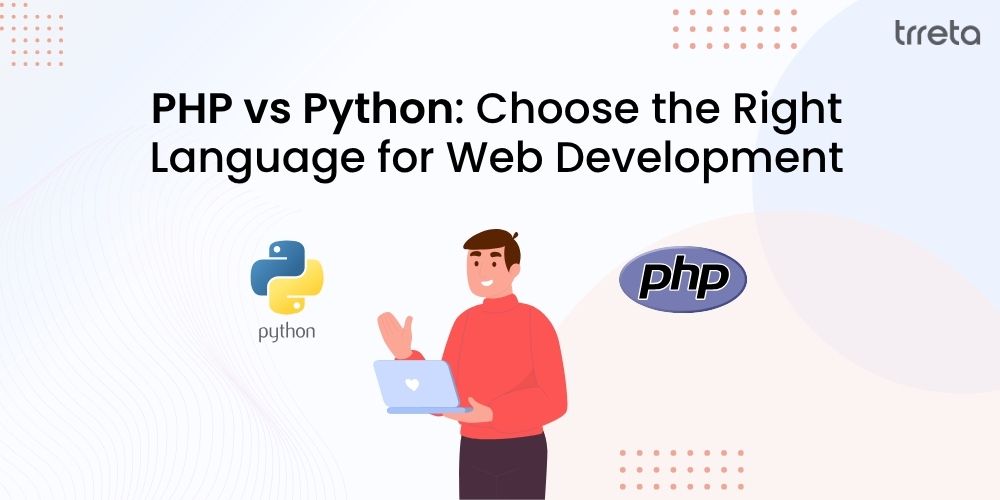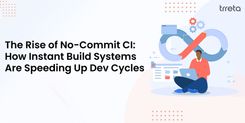When you're building a digital product, your choice of backend language is a technical as well as a business decision!
When you choose the right language, you can have faster development, better performance, and smoother scaling.
And what if you choose the wrong one? Costly rework, compatibility issues, or worse - a product that never quite feels finished.
Today, PHP and Python are two of the most widely used backend languages in the world.
Both have proven their worth over the decades. But which one’s better for your use case?
At Trreta Techlabs, we help founders, CTOs, and business leaders like yours make strategic technology choices!
In this guide, we have covered it all when it comes to PHP vs Python. Starting from an overview of both languages, to comparing Python vs PHP across multiple aspects like performance, flexibility, cost, and long-term value.
So, let’s first get a quick overview of both programming languages.
Overview of Both Languages - PHP vs Python
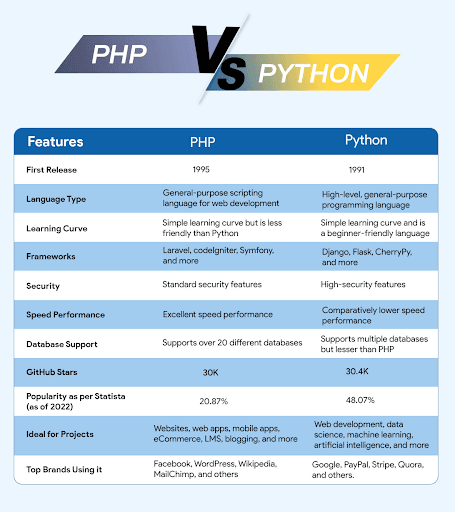
PHP was designed specifically for the web. If you've used WordPress, Magento, or Drupal, you’ve interacted with PHP-powered platforms. It’s especially dominant in CMSs and eCommerce setups.
Want to experience the best PHP Web Development? We can help you get started!
Python, on the other hand, is a general-purpose programming language. So, if you are wondering - what is Python coding used for - we can say that it’s popular in everything from web development to AI/ML, automation, and data science.
Both have massive developer ecosystems, active communities, and extensive libraries.
However, their strengths show up in different types of projects based on the various contexts, like learning curve, developer ecosystem, web development capabilities, performance, speed, scalability, flexibility, security, maintenance, cost, and resource availability.
Let’s have a look at each of these aspects one by one!
Ease of Learning and Developer Ecosystem for PHP vs Python

One of the reasons the programming language Python has exploded in popularity is its simplicity. The syntax feels almost like reading English. That’s great for startups hiring fresh talent or product teams that want quick ramp-up time.
PHP, meanwhile, has a huge talent pool, especially for businesses using WordPress or Laravel. If you're hiring for a content-heavy website or CMS-based app, PHP developers are both easy to find and budget-friendly.
So,
- Choose Python if you want easier onboarding and faster MVPs
- Choose PHP if you're working in CMS or eCommerce-heavy environments
Web Development Capabilities for PHP vs Python

Here’s where the core difference of Python vs PHP comes in -
PHP was literally made for server-side web development. It embeds directly into HTML, making it intuitive for full-stack teams handling content-heavy platforms.
Python, though not originally made for the web, has become a powerhouse, thanks to frameworks like Django and Flask.
These tools allow rapid development of web applications, REST APIs, and even real-time dashboards.
So, for example, if you want to build a simple, static website, PHP can be your best choice, but if you are planning to create a SaaS dashboard or an AI-backed app, then Python is a wise choice!
Also read - 10 Best PHP Frameworks in 2025
Performance and Speed for PHP vs Python
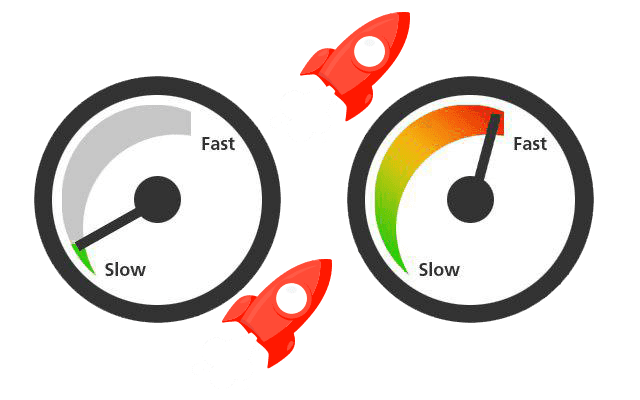
In earlier years, Python was known to outperform PHP in computation-heavy tasks like analytics or real-time data processing.
But since the day PHP 8 has been released with a JIT (Just-In-Time) compiler, the performance gap has narrowed significantly, especially for typical web apps.
However, when it comes to complex algorithms, Python is the first preference!
Scalability and Flexibility for PHP vs Python
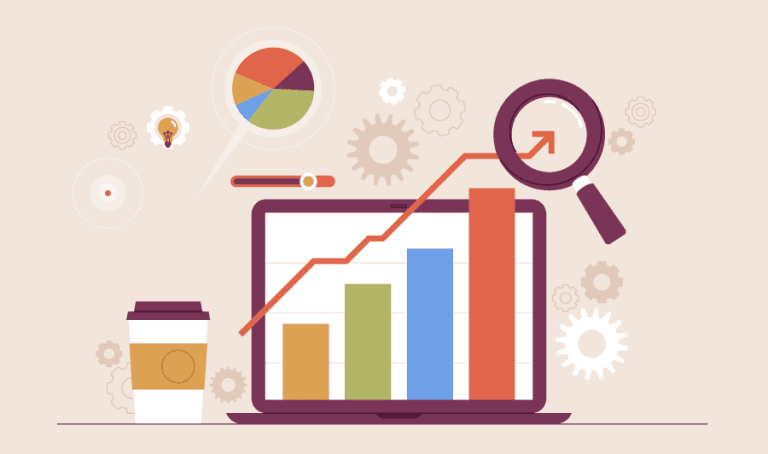
When it comes to scalability and flexibility, Python wins in terms of modularity and integration options.
Its rich libraries make it ideal for apps that will later integrate machine learning, automation, or third-party data platforms. It also fits well in a microservices architecture.
PHP, while scalable, tends to be tied to the LAMP stack (Linux, Apache, MySQL, PHP). That means less flexibility in some modern setups.
So, if you’re building something that needs to grow and evolve, especially across different functionalities, Python gives you more breathing room.
Security and Maintenance for PHP vs Python

Both languages, Python or PHP, can be secure if used with the right practices.
Django, a leading Python framework, comes with default protections against CSRF, SQL injection, and other common threats. It emphasizes security-first architecture.
PHP, too, has matured when it comes to security aspects. Modern frameworks like Laravel offer robust tools for handling vulnerabilities.
The key here lies not in the language but in how your development partner builds the system.
At Trreta, we focus on framework-driven security, not just language-level fixes.
Cost and Resource Availability for PHP vs Python

From a cost perspective, PHP developers are usually more affordable and more easily available, particularly in markets like India, Southeast Asia, and Eastern Europe.
Python developers tend to command higher salaries, especially those with experience in AI, automation, or enterprise applications.
But it’s not just about hiring costs.
While deciding PHP or Python, you also need to consider this -
If you’re building a content-heavy site, PHP saves you both time and money.
But if your roadmap includes data analytics, AI, or automation, Python could give you a much better return on investment.
PHP vs Python - What Should You Use When?
| Use Case | Best Fit |
| Content-driven websites | PHP |
| CMS platforms (e.g. WordPress) | PHP |
| AI-powered apps | Python |
| Fintech, HealthTech platforms | Python |
| Custom dashboards/API apps | Python |
| eCommerce (Magento) | PHP |
In short,
Choose PHP if:
- You need a cost-effective solution
- You’re working with prebuilt tools like CMSs
- You want to launch fast with minimal setup
Choose Python if:
- You're building a scalable SaaS or AI-powered product
- You need to integrate APIs, ML, or automation
- You want flexibility for future upgrades
Pick the Right Solution for PHP Web Development - Trreta Techlabs!
To wrap it up, we can say that the real question isn’t just PHP vs Python, but what are you building, and where do you want it to go?
At Trreta Techlabs, we help you evaluate the backend stack that supports your long-term product roadmap - whether that’s a content-driven CMS or a machine learning-powered platform.
Feel free to contact us today for a free consultation on what tech stack makes the most sense for your business.
FAQs About PHP vs Python
Q1. Is Python better than PHP for web development?
Not always. It depends on your use case. Python is great for complex apps with AI or data needs. PHP is better for content-rich sites and CMS platforms.
Q2. What is Python coding used for in business apps?
Python is used for backend web apps, data pipelines, automation, AI/ML features, chatbots, and even DevOps scripting.
Q3. Is PHP outdated in 2025?
No. PHP 8 has brought modern features and faster performance. It still powers a large part of the internet and continues to be relevant, especially with Laravel.
Q4. Which programming language is better for startups: PHP or Python?
It depends on the product. PHP is faster to launch for simple websites. Python offers more flexibility if you're building something tech-heavy or AI-integrated.
Q5. What are the key advantages of PHP and web development today?
Some of the key advantages of PHP and web development include speed of development, affordability, and ecosystem (e.g. WordPress, Laravel), making it a solid choice for web-first platforms.
